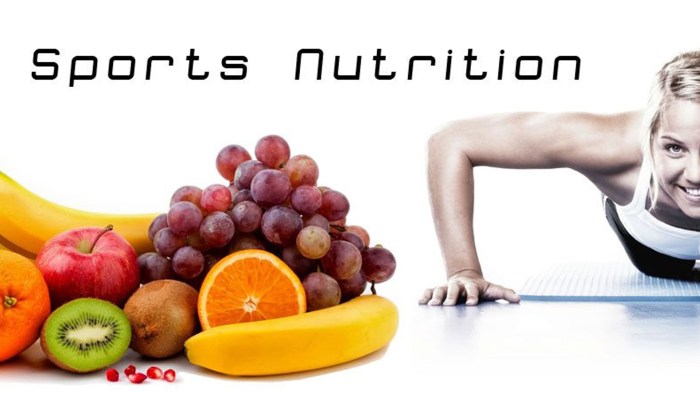Sports nutrition is not just about eating right – it’s about fueling your body for peak performance on the field or in the gym. From the impact of macronutrients to the importance of hydration, this essential guide dives into the key elements that can take your game to the next level.
Whether you’re a seasoned athlete or just starting out, understanding the role nutrition plays in your fitness journey is crucial. Let’s explore the world of sports nutrition and unlock the secrets to maximizing your athletic potential.
Importance of Sports Nutrition

Proper nutrition plays a crucial role in enhancing athletic performance. Athletes require specific nutrients to fuel their bodies, aid in recovery, and maintain overall health.
Impact on Energy Levels
- A balanced diet rich in carbohydrates, proteins, and fats provides the necessary fuel for energy production during exercise.
- Carbohydrates are the primary source of energy for high-intensity activities, while fats are essential for endurance and low-intensity exercises.
- Proteins aid in muscle repair and growth, helping athletes recover faster and perform better in subsequent training sessions or competitions.
Role of Macronutrients and Micronutrients
- Macronutrients such as carbohydrates, proteins, and fats are essential for providing energy, building muscle, and supporting various physiological functions.
- Micronutrients like vitamins and minerals play a crucial role in enzyme function, immune system support, and overall health maintenance.
- A deficiency in micronutrients can lead to decreased performance, increased risk of injuries, and compromised immune function.
Macronutrients in Sports Nutrition
Proper nutrition is crucial for athletes to perform at their best. Macronutrients, including carbohydrates, proteins, and fats, play a key role in fueling the body and supporting recovery. Each macronutrient serves a specific purpose and should be consumed in the right amounts to meet the demands of different types of athletes.
Importance of Carbohydrates
Carbohydrates are the body’s primary source of energy, especially during high-intensity exercise. Athletes, especially endurance athletes, rely heavily on carbohydrates to fuel their performance. High-quality sources of carbohydrates include whole grains, fruits, vegetables, and legumes.
Importance of Proteins
Proteins are essential for muscle repair and growth, making them vital for athletes, particularly those engaged in strength training. Good sources of protein include lean meats, poultry, fish, eggs, dairy products, and plant-based sources like beans and nuts.
Importance of Fats
Fats are another important energy source for athletes, especially during longer endurance activities. They also play a role in hormone production and nutrient absorption. Healthy fats can be found in avocados, nuts, seeds, olive oil, and fatty fish.
Macronutrient Ratio Recommendations
– Endurance Athletes: A common recommendation for endurance athletes is to consume a diet consisting of about 60-65% carbohydrates, 15-20% protein, and 20-25% fats.
– Strength Training Athletes: For athletes focusing on strength training, a typical macronutrient ratio is around 40-50% carbohydrates, 25-35% protein, and 25-35% fats.
Micronutrients and Hydration: Sports Nutrition

When it comes to sports nutrition, micronutrients and hydration play a crucial role in an athlete’s performance and recovery. Let’s dive into the key micronutrients essential for athletes and the importance of staying hydrated during physical activity.
Key Micronutrients for Athletes
Athletes require a variety of micronutrients to support their overall health and performance. Some key micronutrients include:
- Vitamin D: Essential for bone health and immune function.
- Iron: Important for oxygen transport in the blood.
- Zinc: Supports immune function and helps with recovery.
- Magnesium: Aids in muscle function and energy production.
Hydration in Sports Performance, Sports nutrition
Hydration is crucial for athletes to maintain optimal performance levels. Dehydration can lead to decreased energy levels, muscle cramps, and impaired cognitive function. It’s essential to:
- Drink water regularly throughout the day, not just during exercise.
- Monitor urine color to ensure adequate hydration – aim for pale yellow.
- Consider electrolyte-rich drinks for intense workouts to replace lost minerals.
Maintaining Electrolyte Balance
Electrolytes are minerals like sodium, potassium, and chloride that are essential for muscle function and hydration. To maintain electrolyte balance during intense physical activity, consider the following tips:
- Consume electrolyte-rich foods like bananas, nuts, and leafy greens.
- Use sports drinks with electrolytes for prolonged exercise sessions.
- Avoid excessive sweating by cooling down properly after workouts.
Pre-Workout and Post-Workout Nutrition
When it comes to maximizing your performance and recovery, paying attention to your pre-workout and post-workout nutrition is crucial. These meals and snacks can make a significant difference in how you feel during and after your training sessions.
Ideal Pre-Workout Meals/Snacks
Before hitting the gym or heading out for a run, it’s important to fuel your body with the right nutrients to prevent fatigue and optimize your performance. Ideal pre-workout meals or snacks should include a mix of carbohydrates, protein, and a small amount of healthy fats.
- Whole grain toast with almond butter and banana
- Greek yogurt with berries and a sprinkle of granola
- Oatmeal topped with nuts and a drizzle of honey
- Turkey and avocado wrap
Significance of Post-Workout Nutrition
After a tough workout, your muscles need proper nourishment to recover and grow stronger. Post-workout nutrition plays a crucial role in muscle recovery and glycogen replenishment, helping you bounce back faster for your next session.
Optimal recovery meals should focus on replenishing glycogen stores and providing your body with the necessary nutrients to repair muscle tissue.
Examples of Nutrient-Dense Meals for Recovery
- Grilled chicken breast with quinoa and roasted vegetables
- Salmon with sweet potato and steamed broccoli
- Egg omelette with spinach, tomatoes, and whole grain toast
- Smoothie made with protein powder, banana, spinach, and almond milk
Supplements in Sports Nutrition
In the world of sports nutrition, supplements play a vital role in enhancing athletic performance and aiding recovery. These additional products are designed to provide athletes with specific nutrients that may be lacking in their regular diet, helping them achieve optimal results on and off the field.
Role of Supplements in an Athlete’s Diet
Supplements are used to fill in the gaps left by a regular diet, ensuring that athletes meet their nutritional needs for peak performance. They can help improve energy levels, muscle recovery, and overall health, giving athletes the edge they need to excel in their sport.
Common Supplements in Sports Nutrition and Their Benefits
- Protein Powder: Helps build and repair muscles, essential for muscle growth and recovery.
- Creatine: Boosts muscle strength and power, improving exercise performance.
- BCAAs (Branched-Chain Amino Acids): Aid in muscle recovery, reduce muscle soreness, and prevent muscle breakdown.
- Omega-3 Fatty Acids: Reduce inflammation, support heart health, and improve joint function.
- Vitamin D: Essential for bone health, immune function, and muscle strength.
Consulting with a Nutritionist or Dietitian Before Incorporating Supplements
Before adding any supplements to their diet, athletes should consult with a nutritionist or dietitian to ensure they are taking the right products in the correct amounts. These experts can provide personalized recommendations based on the athlete’s specific needs and goals, helping them maximize the benefits of supplementation while minimizing any potential risks.